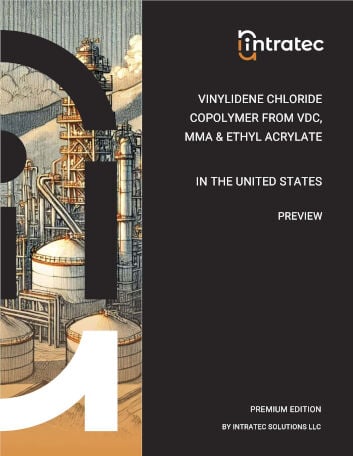Commodity Production Costs Report
Vinylidene Chloride Copolymer from VDC, MMA & Ethyl Acrylate
Polyvinylidene Chloride Plant Capital & Operating Cost Analysis | United States | Q4 2025
This report presents the economics of Vinylidene Chloride Copolymer production from vinylidene chloride, ethyl acrylate, and methyl methacrylate. The process examined is a typical emulsion polymerization process. In this plant, vinylidene chloride, ethyl acrylate, and methyl methacrylate are reacted to produce PVDC.
The report provides a comprehensive study of Polyvinylidene Chloride production and related Polyvinylidene Chloride production cost, covering three key aspects: a complete description of the Polyvinylidene Chloride production process examined; an in-depth analysis of the related Polyvinylidene Chloride plant capital cost (Capex); and an evaluation of the respective Polyvinylidene Chloride plant operating costs (Opex).
The Polyvinylidene Chloride production process description includes a block flow diagram (BFD), an overview of the industrial site installations, detailing both the process unit and the necessary infrastructure, process consumption figures and comprehensive process flow diagrams (PFD). The Polyvinylidene Chloride plant capital cost analysis breaks down the Capex by plant cost (i.e., ISBL, OSBL and Contingency); owner's cost; working capital; and costs incurred during industrial plant commissioning and start-up. The Polyvinylidene Chloride plant operating costs analysis covers operating expenses, including variable costs like raw materials and utilities, and fixed costs such as maintenance, labor, and depreciation.

Product
Polyvinylidene Chloride. Polyvinylidene Chloride is a thermoplastic polymer known for its excellent barrier properties, particularly in food packaging. It is polymerized from vinylidene chloride. Its low permeability to water vapor and gases extends the shelf life of packaged goods.
Raw Materials
Methyl Methacrylate. Methyl Methacrylate (MMA) is a critical monomer used in the production of acrylic plastics, coatings, and adhesives. It is known for its transparency and impact resistance, making it ideal for use in automotive, construction, and optical applications. MMA is produced via the esterification of methacrylic acid and methanol. It is stored as a liquid and is crucial to industries focused on durable, clear, and weather-resistant products.
Vinylidene Chloride. Vinylidene chloride is used as a monomer in the production of polyvinylidene chloride (PVDC), which is applied in food packaging due to its excellent barrier properties. It is also used in coatings and textiles. Vinylidene chloride is produced via dehydrochlorination of 1,1,2-trichloroethane and is stored as a volatile liquid. Its role in creating durable, moisture-resistant films makes it integral to food preservation technology.
Ethyl Acrylate. Ethyl acrylate is an acrylate monomer used in producing polymers and resins for paints, adhesives, textiles, and plastics. It imparts flexibility and durability to acrylic products. Manufactured through the esterification of acrylic acid with ethanol, it is stored as a flammable liquid. Its ability to copolymerize with other monomers allows customization of material properties for specific applications.
Report in PDF Format
Download & Explore Anytime
Access in Various Devices
Print & Read Comfortably
Share With Co-workers
Up-to-date Report
Professional report based on Q4 2025 economic data, ensuring timely evaluations.
Multiple Use Cases
Ideal for investment screening, feasibility studies, cost estimates, and research planning.
Proven Methodology
Developed using a consistent methodology honed over a decade, ensuring reliable cost analyses.
Report Editions
Content Highlights
Plant Capital Cost Summary
Summary outlining the capital cost required for building the Polyvinylidene Chloride production plant examined.
Plant Capital Cost Details
Detailing of fixed capital (ISBL, OSBL & Owner’s Cost), working capital and additional capital requirements.
Plant Cost Breakdowns
Breakdown of Polyvinylidene Chloride process unit (ISBL) costs and infrastructure (OSBL) costs; plant cost breakdown per discipline.
Operating Costs Summary
Summary presenting the operating variable costs and the total operating cost of the Polyvinylidene Chloride production plant studied.
Operating Cost Details
Detailing of utilities costs, operating fixed costs and depreciation.
Plant Capacity Assessment
Comparative analysis of capital investment and operating costs for different Polyvinylidene Chloride plant capacities.
Production Process Information
Block Flow Diagram, descriptions of process unit (ISBL) and site infrastructure (OSBL).
Process Consumptions
Raw materials and utilities consumption figures, by-products credits, labor requirements
Process Diagrams
Process flow diagrams (PFD), equipment list and industrial site configuration
Other Polyvinylidene Chloride Production Cost Reports

Vinylidene Chloride-Vinyl Chloride Copolymer Production
This report presents the economics of Vinylidene Chloride Copolymer production from vinylidene chloride (VDC) and vinyl chloride using a suspension polymerization process. The economic analysis approaches a plant located in the United States.
Details: 15 kta United States-based plant | Q4 2025 | 107 pages | Issue A | From $799 USD
Bundle & Save
Purchase multiple Polyvinylidene Chloride Production Cost reports and enjoy tiered discounts
up to 10% off!
Could Not Find the Report You Need?
Obtain a Bespoke Report
Get a report targeting the process in which you are interested
See Offer Details
Understand Bespoke Reports and how you can easily order them
Check Editions & Pricing
Complete a brief form and see a quotation for your Bespoke Report
Other Related Production Cost Reports

Methyl Methacrylate Production from Acetone and Hydrogen Cyanide
This report presents the economics of a process similar to Evonik Aveneer for Methyl Methacrylate (MMA) production from acetone and hydrogen cyanide (HCN) in the United States. Initially, HCN purchased from external suppliers, acetone and methanol are used as raw materials for the production of MMA in six main steps, which are described in the report.
Details: 120 kta United States-based plant | Q4 2025 | 107 pages | Issue B | From $1,199 USD

Methyl Methacrylate Production from Isobutylene
This report presents the economics of an oxidation process similar to Sumitomo/ Nippon Shokubai process for Methyl Methacrylate (MMA) production from isobutylene in the United States. Initially, isobutylene is oxidized to methacrolein, which is further oxidized to methacrylic acid (MAA). Then, MAA is esterified with methanol to produce MMA.
Details: 120 kta United States-based plant | Q4 2025 | 107 pages | Issue A | From $1,199 USD
+800 Reports Developed, Targeting +250 Commodities
Vast Report Library
858 independent and up-to-date reports examining embryonic and established production processes.
Free Sample Reports
Quickly understand the structure and depth of content of our professional reports.

